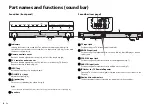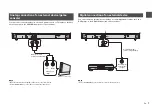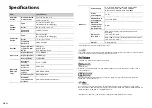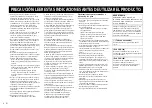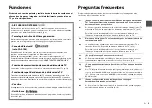
15
En
Troubleshooting
Refer to the table below when the sound bar does not function properly. If the problem
you are experiencing is not listed below or if the instructions below do not help, turn off
the sound bar, disconnect the power cable, and contact the nearest authorized Yamaha
dealer or service center.
First, check the following:
A
The power cables of the sound bar, TV and playback devices (such as BD
players) are connected to AC wall outlets securely.
B
The sound bar, TV and playback devices (such as BD players) are turned on.
C
The connectors of each cable are securely inserted in to jacks on each device.
Power and system
Audio
Problem
Cause
Remedy
The power turns
off immediately.
The auto power standby function
worked.
When the auto power standby
function is enabled and one of the
following conditions is met, the
sound bar will automatically turn
off.
- No operations for 8 hours
- No audio input and no
operations for 20 minutes when
BLUETOOTH is selected as the
input source.
Disable the auto power standby
function (p.14).
The power
cannot be turned
on.
The protection circuitry has been
activated three times
consecutively. (If you try to turn on
the power in this condition, the
STATUS indicator flashes.)
For product protection, the power
cannot be turned on. Unplug the
power cable from the AC wall outlet
and contact the nearest authorized
Yamaha dealer or service center.
The sound bar is
not reacting.
The internal microcomputer is
frozen, due to an external electric
shock (such as lightning or
excessive static electricity) or to a
drop in the power supply voltage.
Hold down
(power) on the front
panel of the sound bar for more than
10 seconds to reboot it. (If the problem
persists, disconnect the power cable
from the AC wall outlet and plug it
again.)
The sound bar
operates by
itself.
Another
Bluetooth
device is being
operated nearby.
Terminate
Bluetooth
connection of the
sound bar (p.11).
TV’s 3D glasses
do not work.
The sound bar is blocking the 3D
glasses transmitter of your TV.
Check the position of the 3D glasses
transmitter of your TV and adjust the
position of the sound bar. If necessary,
remove the stands of the sound bar
(p.5).
Problem
Cause
Remedy
No sound.
Another input source is selected.
Select an appropriate input source
(p.8).
The mute function is activated.
Cancel the mute function (p.9).
The volume is too low.
Turn up the volume (p.8).
No sound is
coming from the
subwoofer.
The volume of the subwoofer is
too low.
Turn up the volume of the subwoofer
(p.8).
The playback source does not
contain low-frequency signals.
Play back a sound source containing
low-frequency signals.
The volume
decreases when
the sound bar is
turned on.
The automatic volume adjustment
function worked.To prevent
excessive loudness, the sound
bar automatically controls its
volume within a certain level when
the sound bar is turned on.
If necessary, turn up the volume (p.8).
No surround
effect.
Stereo playback is selected.
Select surround playback (p.9).
The volume is too low.
Turn up the volume (p.8).
The TV or playback device is set
to output 2 channel audio (such
as PCM) only.
Change the digital audio output setting
on the TV or playback device to Dolby
Digital or BitStream.
The audio is output from the TV
built-in speakers.
Set the TV volume to minimum (p.6).
Noise is heard.
The sound bar is too close to
another digital or high-frequency
device.
Move those devices away from the
sound bar.




